Heart And Soul: artists, athletes, politicians...
Prominent artists like musicians Yehudi Menuhin, Mstislav Rostropovich,
Carlo Maria Giulini, Daniel Barenboim, Riccardo Muti,
Myung-whun Chung, Adolf Busch, composers Béla Bartók,
Dmitri Shostakovich, Benjamin Britten, Olivier Messiaen,
painter Vincent van Gogh, writers Albert Camus, Vercors (Jean Bruller),
Roger Grenier, Václav Havel and many others I am afraid I cannot list, have placed brotherhood,
peace and art above all other things - including themselves.
Other people, from different walks of life, also stood up for humanitarian causes and peace: popular music artists - including Midnight Oil,
Johnny Clegg, Roger Waters, Peter Gabriel and some others -,
athletes - like cyclist Gino Bartali -, and even a few odd politicians like Nelson Mandela.
Yehudi Menuhin
Violinist and conductor Yehudi Menuhin (22 April 1916, New York - 12 March 1999, Berlin), one of the greatest violinists of the 20th century, who studied under George Enescu and Adolf Busch among others, performed for Allied soldiers during World War II, and for survivors of concentration camps in 1945, accompanied by Benjamin Britten on the piano. He came back to play in Germany shortly after with the Berlin Philharmonic under Wilhelm Furtwängler as an act of reconciliation.

He also supported Béla Bartók, Mstislav Rostropovich and Miguel Ángel Estrella to
name but a few. He was particularly noted for his interpretations of the music of Johann Sebastian Bach, Béla Bartók, Ludwig van Beethoven, Johannes
Brahms, Wolfgang Amadeus Mozart...
He established a school in Stoke d'Abernon, England, a charity in the UK, a foundation in Paris, etc., to help young musicians and allow professionals
to play music in the community.
He criticised the Soviet regime and Israel's occupation of the West Bank several times, promoting a solution where both people would live in peace,
and played for Palestinian refugees. He received the Nehru Peace Prize in 1960 and was UNESCO goodwill ambassador in the 1990s and also served as
its International Music Council president.
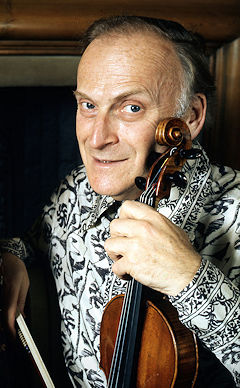
Mstislav Rostropovitch
Cellist and conductor Mstislav Rostropovich (27 March 1927, Baku - 27 April 2007, Moscow), one of the greatest cellists of the 20th century, also a proficient pianist, fought for freedom of speech and cultural freedom in the USSR: he quit the Moscow Conservatory in protest to the dismissal of Dmitri Shostakovich in 1948, made his home a shelter to Alexander Solzhenitsyn in 1970. He was finally forced into exile and deprived of his Soviet citizenship.
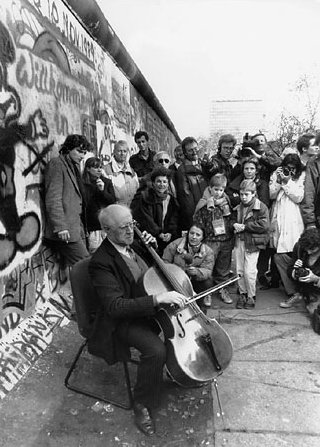
Rostropovich's most remarkable interpretations included works by Johann Sebastian Bach, Ludwig van Beethoven, Johannes Brahms and contemporary
music by Benjamin Britten, Henri Dutilleux, Witold Lutoslawski, Alfred Schnittke and
Dmitri Shostakovich.
He was a key figure in the help to the Armenian Relief Society after the 1988 earthquake. The following year, "Slava" gave an impromptu performance
of Bach cello Suites by the Berlin Wall during its fall. The images were shown on TV all over the world. His Soviet citizenship was restored in 1990
by Mikhail Gorbachev. He travelled to Moscow to defend democracy during the aborted 1991 August Coup. He was a goodwill
ambassador for the UNESCO as of 1998, and initiated different foundations to help children in the ex-USSR.
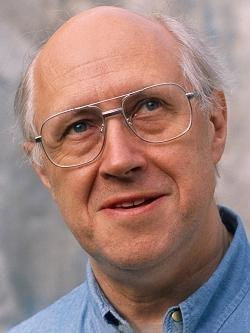
Carlo Maria Giulini
The great Italian conductor Carlo Maria Giulini (9 May 1914, Barletta - 14 June 2005, Brescia) was initially a viola player in one of the very best Italian orchestras in Rome, and played under the most important conductors of the time. His reference was Bruno Walter, who made every musician feel important, a quality he would himself possess. He was about to start conducting when WW2 broke and he was sent to Croatia. A pacifist, he was strongly opposed to fascism and refused to fire at another human being. He married his love Marcella during a leave and when the Nazis took control of Italy and Italian soldiers were ordered to fight by their side, he went into hiding for almost a year, staying with friends and a Jewish family.

After the war, he conducted the orchestra for the first time and his reputation grew quickly in Italy, then in the rest of the world. He first focused
on opera (becoming the Scala principal conductor), and later moved to orchestral music, as he became disenchanted with opera management as he felt he
could not serve the music at the absolute best.
His interpretations of Bach, Haydn, Mozart, Beethoven. Schubert, Brahms, Bruckner, Mahler, Debussy, Ravel or Verdi remain unique for their spiritual
elevation and expressiveness, inner tension and elegance. He rarely played music from the second half of the 20th century - with the notable exception
of Britten's War Requiem, dear to his heart - mainly because he required a vast amount of time before feeling ready to
play the music. He was adored by musicians (and audiences) for his immense respect and love of both the music and the persons he worked with.

Daniel Barenboim
Pianist and conductor Daniel Barenboim (born 15 November 1942 in Buenos Aires) was, like Yehudi Menuhin, a child prodigy. He has developed friendships with numerous prominent musicians in the different countries he played in and learned multiple languages. In 1989, he conducted the Berlin Philharmonic just after the fall of the Wall, in a free concert reserved to Berlin-Easters. He has repeatedly publicly criticized Israel for its attitude towards the Palestinian people and defended the solution of two independent countries leaving in peace. He has initiated an orchestra with Israeli, Palestinian, Arab and European musicians - the West-Eastern Divan - with Palestinian intellectual Edward Said in 1999.

He was the first to conduct the Berlin Philharmonic in Israel and also the first to play Richard Wagner's music in Israel in 2001, as a second encore
and after a long debate with the audience. He also played some Wagner with the Israel Philharmonic and the West-Eastern Divan. A regular conductor in Israel,
he has performed in the West Bank and Gaza Strip, including a concert in 2011 with the assistance of the UNO and members of the greatest European orchestras.
He has created foundations - sometimes with Edward Said - and an academy in several countries, to help young musicians through music schools, grants and other
actions. He is citizen of several countries including Israel and Palestine, a unique situation.
Barenboim has special bonds with the music of Johann Sebastian Bach, Béla Bartók, Ludwig van Beethoven, Johannes Brahms,
Anton Bruckner, Frédéric Chopin, Claude Debussy, Wolfgang Amadeus Mozart, Franz Schubert...
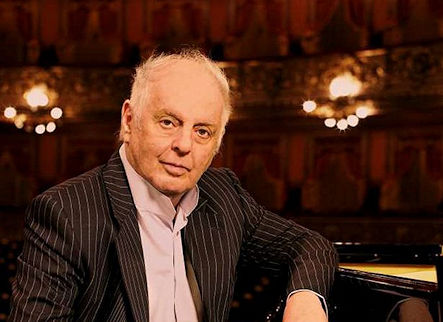
Riccardo Muti
Conductor Riccardo Muti (born 28 July 1941 in Napoli) has been conducting the most important orchestras for more than 50 years. In the recent decades, he has been vocal on several occasions about cuts in culture budgets, like in 2011 during the festivities for the 150 years of Italian unity. He founded a youth orchestra and an academy in Ravenna centred on singing and conducting.
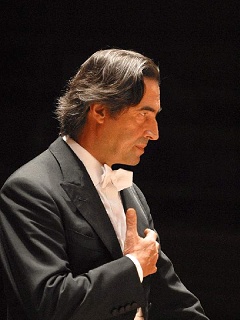
Riccardo Muti has a special love for composers such as Beethoven, Haydn, Mozart, Schubert, Schumann, Tchaikovsky, Italian opera composers, and
also enjoys playing lesser known composers and works.
As of the mid 1990s, he has worked for the "Le Vie dell'Amicizia" project which is linked to the Ravenna Festival, conducting in places with a
recent tragic history, such as Sarajevo, Beirut, Jerusalem, Moscow, Yerevan, Istanbul, New York, Cairo, Damascus, Nairobi, Tokyo, Tehran, Kiev...

Myung-whun Chung
Conductor and pianist Myung-whun Chung (born 22 January 1953 in Seoul) was assistant to Carlo Maria Giulini whom he admired before taking permanent positions in Europe, while travelling as a guest conductor. He has a deep bond with Olivier Messiaen with whom he collaborated, and created his last work.

Myung-whun Chung has focused mainly on composers of the 19th and 20th centuries, including Gustav Mahler, Hector Berlioz, Dmitri Shostakovich,
the aforementioned Messiaen, Henri Dutilleux and also operas of the same period.
He has devoted an important part of his life to humanitarian and ecological causes. He has launched a series of musical and environmental projects in Korea for
youth and he has served as Ambassador for the Drug Control Program at the United Nations. He has also taken part in efforts of the South Korean Red Cross and UNESCO.
He has been UNICEF goodwill ambassador since 2008.

Adolf Busch
Violinist and conductor Adolf Busch (8 August 1891, Siegen - 9 June 1952, Guilford, Vermont) dedicated his life to music. He was a great soloist, a remarkable chamber music player, the primarius of the outstanding Busch Quartet and the leader of chamber ensembles. His partners or pupils included such luminaries as Rudolf Serkin and Yehudi Menuhin. He and his brothers Hermann and Fritz, were among the most important German musicians of the time.
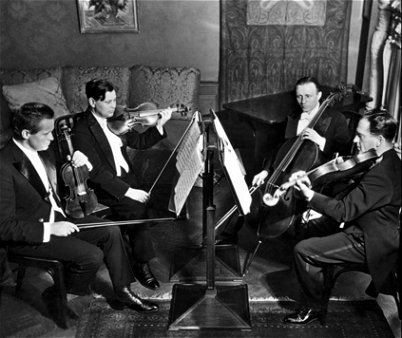
Busch left extraordinary recordings of Johann Sebastian Bach, Ludwig van Beethoven, Johannes Brahms, Wolfgang Amadeus Mozart, Franz Schubert, Robert
Schumann...
A noble soul, he was a fierce anti-nazi, and chose to go into exile as soon as 1933. He and his family left Germany despite their prominent position and the tempting
offers made by the Nazis. They first went to Switzerland and then settled in Vermont in the USA. He would rather start from zero all over again in a free country
than caution such a vile regime.

Béla Bartók
Béla Bartók (25 March 1881, Nagyszentmiklós - 26 September 1945, New York) was a brilliant pianist, one of the major composers of the 20th century, and the co-founder of ethnomusicology, who recorded a large collection of folk songs in several countries. He was also a renowned teacher: his students included Georg Solti, György Sándor and Fritz Reiner, and he also worked with Sándor Végh. He developed a highly personal style, despite numerous influences and wrote many masterpieces. He had a deep love for his country but was totally open to other nations and cultures, and loved nature and hiking.
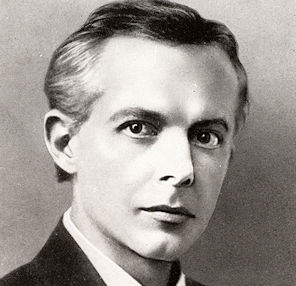
Bartók had high moral standards and despised the Nazis. He would not travel to Germany anymore, refused to have his works published or played by people linked to the
Nazis. He even requested that they would be included in a "degenerate" music exhibition. He was also opposed to the Hungarian regime which treated Nazis as allies, and
went as far as to claim that he was a Jew in protest to what was going on. He wrote his 6th string quartet in 1939, a masterpiece filled with sadness and rage.
After the death of his mother, he thought he had no other choice than self-imposed exile, and left for New York in 1940.

The exile was heartbreaking, his health started deteriorating and his financial situation was difficult. If he did not accept any form of favour or
charity, he was glad to accept commissions and several musicians - including Yehudi Menuhin asked him to compose for
them. When WWII ended he was quite wary about the communists fearing another dictatorship, in opposition to his ideal of a world without war nor
hate between nations.
His corpus includes masterpieces in ballet (The Miraculous Mandarin), opera (Bluebeard's Castle), chamber music (String Quartets, Violin Sonata, Sonata
for two Pianos and Percussion...), concertante works (piano or violin concertos), orchestral music (Four Pieces, Music for Strings, Percussion and Celesta,
Divertimento, Concerto for Orchestra), piano, and some of his lesser known Choral works.
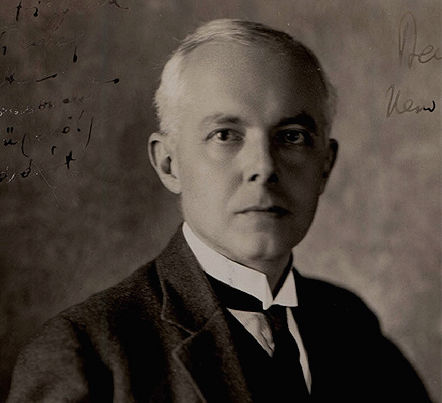
Dmitri Shostakovich
Dmitri Shostakovich (25 September 1906, Sankt-Peterbourg - 9 August 1975, Moskva) was one of the major composers of the 20th century in spite of the countless pressure attempts during the darkest hours of the soviet regime. He started as a pianist but soon composed in parallel, being encouraged by Alban Berg, Bruno Walter, Toscanini... His first works got quite successful, even at the beginning of the Great Terror, and he managed to remain independent, until the article written in the "Pravda" in early 1936, which violently attacked his music and clearly threatened him, followed by another article and a condemnation by the Soviet Composers Union. Only a few - including Prokofiev - were brave enough to side by him. He was declared an "enemy of the people" which usually meant deportation, or worse. He then preferred to alternate between personal compositions - that he kept "in the drawer" - official ones which seemed to follow the regime orders, and a lot of film music, which allowed him to have some basic income for his family and was less dangerous for him. He wrote his first string quartet - quartets would become a major field for personal expression, less risky than operas or symphonies. He met success again, but he remained quite aware of the sword of Damocles above his head and lived in permanent fear.
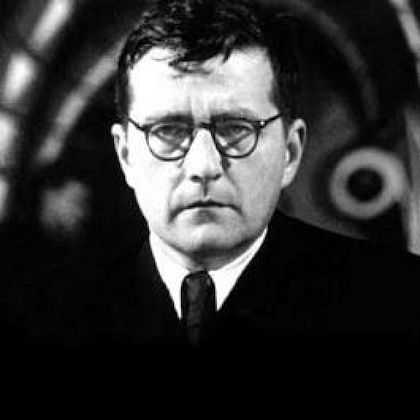
During WWII, he enrolled in a fire brigade and worked on the "Leningrad" symphony during the siege of his home-city, which was an immediate international success, then the 8th, one of his greatest masterpieces. In 1948, he was once again attacked by the regime, was forced into self-criticism, and lost his teaching position. He kept on composing, but did not have the works played or published. Jewish themes started to appear at this time. As the regime softened in the mid-1950s, some of the "drawer" pieces which had been kept secret could be created. During the next two decades, he continued composing symphonies, concertos for David Oistrakh or Mstislav Rostropovich, chamber music - including numerous quartets -, some of these pieces being private confessions, others the denunciation of war and dictatorship (the admirable 7th and 8th string quartets, the viola and piano sonata...), while his health deteriorated and the soviet regime blew hot and cold.

Benjamin Britten
Benjamin Britten (22 November 1913, Lowestoft - 4 December 1976, Aldeburgh), one of Great Britain's most important composers, was also a noted pianist and conductor. In the 1930s he became an active member of a pacifist union. During the war he was recognized as conscientious objector. In 1945 he rose to international fame with his opera "Peter Grimes" and travelled to Germany with Yehudi Menuhin to play music to survivors of the concentration camps. What he witnessed there had an everlasting impact on him. He co-founded the Aldeburgh Festival with tenor Peter Pears in 1948. He taught his unique private pupil, Arthur Oldham, for three years and kept on composing - mainly operas - during the 1950s.
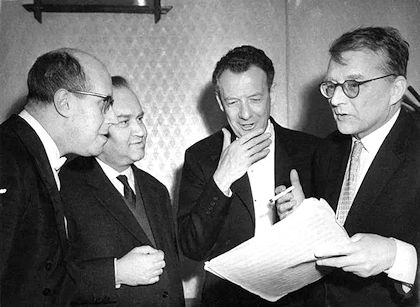
He befriended fellow-composer Dmitri Shostakovich, cellist Mstislav Rostropovich and pianist Sviatoslav
Richter. He was asked to compose a work for the consecration of the new Cathedral in Coventry - the old
one having been almost totally destroyed by Nazi bombings during WWII. In 1962 the "War Requiem" was created in Coventry's Cathedral and instantly recognized as a masterpiece.
Britten chose to commemorate the dead of both World Wars, in a large-scale score including three soloists, a chorus and a boys' choir, a chamber ensemble and a large orchestra,
with texts from both the traditional Requiem Mass and deeply moving poems by Wilfred Owen who had been killed in France a week before the end of WWI. He requested there would
be no applause at the end of the performance.
The three soloists were supposed to be Russian, English (Pears) and German (Dietrich Fischer-Dieskau) in sign of reconciliation, but the Soviets prevented Galina Vishnevskaya
from travelling. Shostakovich said to Rostropovich that he believed it to be "the greatest work of the 20th century". The work was quickly recorded by Britten - with Vishnevskaya -
and other prominent conductors like Carlo Maria Giulini. A concert took place in Coventry's Cathedral in 2012 for the 50th anniversary of the
work and Cathedral under maestro Andris Nelsons.

Olivier Messiaen
Olivier Messiaen (10 December 1908, Avignon - 27 April 1992, Clichy), major composer of the 20th century, renewed French music with his personal inspiration which did not forget the past, integrated remote influences (Greece, India, Indonesia...), birdsongs - that he would become an expert of - and associated colours and certain chords. Organist, pianist, he was also a renowned teacher and mentor of numerous young composers, conductors and pianists. During the 1930s, he experimented while improvising on the organ and composed many pieces. He was taken prisoner of war and sent to a stalag. A fervent catholic, he composed in 1941 his "Quatuor pour la fin du Temps" for violin, clarinet, cello and piano, which were the available instruments, and created it with three fellow-prisoners for the group of inmates.
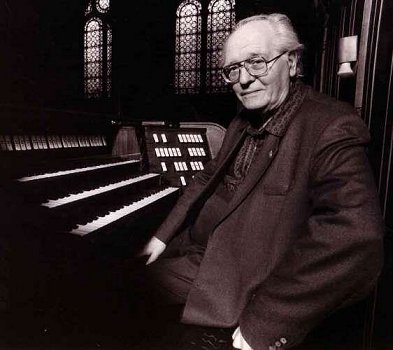
In 1964 he composed "Et exspecto resurrectionem mortuorum", an incredibly powerful piece, to commemorate the dead of both world wars, premièred the following year in Paris
Sainte-Chapelle and in public in Chartres Cathedral with the Général de Gaulle attending.
He later spent eight years composing - also writing the libretto - and orchestrating one of his highest masterpieces, the opera "Saint-François d'Assise", based on the
Saint's life.
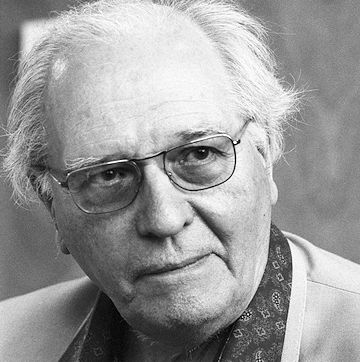
Vincent van Gogh
Vincent van Gogh (30 March 1853, Groot-Zundert - 29 July 1890, Auvers-sur-Oise) was of course the great painter we know, but he was much more than that. After realizing that he did not want to be an art dealer, he felt attracted by a religious life. He travelled to England where he began teaching and preaching in 1876, before returning to Netherlands. He started a frugal life and theological studies but without success. He chose to become a missionary and was sent near Mons in the mining district of Borinage at the end of 1878. He lived there in the greatest poverty, preaching, teaching children to read and write and the bible study, visiting the sick, witnessing the miners' poverty and suffering, and chose to live like them. The miners were quickly moved by all he was doing for them and more and more of them came to listen to him, "this man not like the others".
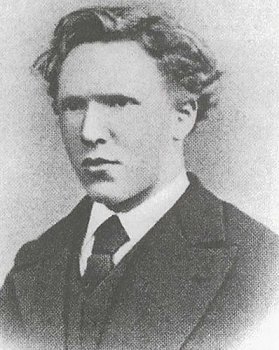
The same thing happened in the different places he was sent to in the Borinage. Even though his hierarchy proved discontent and said his behaviour was incompatible with the mission that they had entrusted him with, he redoubled his efforts. During a typhus epidemic, he rushed around to help the sick, giving the little he had kept. He wanted to go down a mine and 700 meters underground realized that the conditions were even worse than he had imagined. He asked for better conditions for the miners. Vincent helped after a firedamp explosion which took place in one of the mines, and healed a miner that doctors considered beyond all hope, and saved him. The miners went on strike, and Vincent organized collections to help. That was it for his hierarchy which decided to get rid of him. But decades after his death, Borinage inhabitants remembered him and what he had done for them.
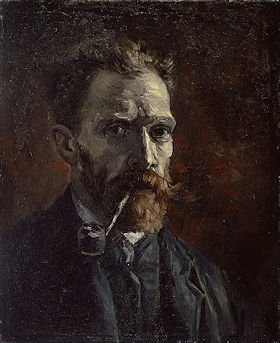
During all this time Vincent used to draw, often giving his sketches to children. A vicar bought two of them, at the time Vincent was leaving the district, and advised him to work to develop his gift. That is what van Gogh did, beyond expectations, but he was never really understood. Once he had become a painter, he dreamt of an artist collective based on friendship which he tried to give life to when he settled in Arles.
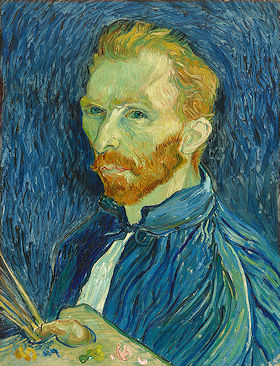
Albert Camus
Albert Camus (7 November 1913, Mondovi - 4 January 1960, Villeblevin) was a writer, philosopher, and journalist. But he was also a man of action: he joined the Resistance and
was highly involved with theatre. He was born in a poor family: his mother could not read nor write ; his father was killed at the beginning of WWI. One of the few things he
knew about him - through his mother - was that his father had been sick when seeing an execution take place. His uncle Gustave helped him develop interests and gave him access
to his library. So did his primary school teacher, Louis Germain, who helped him secure a scholarship to continue his studies - Camus will dedicate his Nobel Prize speech to him
in recognition of his help.
A good football goalkeeper, he was diagnosed with tuberculosis and was hospitalized. He started writing by 1933 and was encouraged by his philosophy teacher Jean Grenier. He
studied philosophers - from ancient Greece, the early Christian times and Germany - as well as novelist-philosophers Fyodor Dostoyevsky and Franz Kafka. By then, Camus was
already strongly anti-fascist and opposed to authoritative colonialism. In 1935 he joined the communist party, as he shared some values with them. This lead to his first theatre
experience as founder of a company. But he disliked the party reversal the following year, protested and got expelled. With his friends he founded a new troupe which staged a
play based on a short story by André Malraux and joined Pascal Pia's newspaper to become quickly its editor-in-chief.
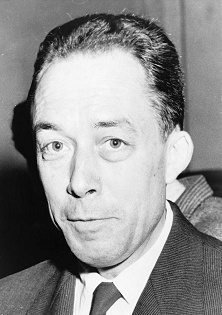

He moved to Paris in 1940 to work with Pia in another newspaper. He wrote "L'étranger", and Malraux, appreciative of the work, recommended it for publishing. The novel got
published in 1942. He worked on several plays including "Caligula" in 1944 and also worked on "La Peste". At the same time he joined the Resistance and soon became chief editor
at "Combat", an outlawed newspaper. After the Liberation, he remained at "Combat", trying to promote an unbiased and high-quality journalism. He was a lonely voice in the western
world that condemned the use of the atomic bomb. He became one of the voices that counted in France and beyond, and developed correspondences or/and friendships with Malraux,
André Gide, François Mauriac and René Char.
He gave lectures at various universities in several countries including in the Americas. He was supportive of European integration and had become wary of the communists after
their multiple u-turns: he was opposed to totalitarian communism and feared Soviet expansionism - just a few years before what happened in several central Europe countries in
the late 1940s or during the 1950s. In 1947 "La Peste" was a major success and he published a new play two years later, "Les Justes".

He disliked and feared ideologies as they tend to forget men and he believed that morality should guide men and politics - he resigned from his work for UNESCO when the UNO
accepted Spain, which was still ruled by a dictator, and wrote an essay against capital punishment. Attacked by some of the communist "intellectuals" and ancient friends,
he kept on questioning his ideas, permanently asking himself "Am I not wrong?", but remained true to them in the end. He wrote a new book, "La chute", whose tone was much
more pessimistic. In 1956 he travelled back to (still French) Algeria, and promoted a peaceful balanced solution advocating for a pluralistic country. But French colonialists
and Algerian separatists did not want a fair solution. He was threatened and had become a lonelier voice than ever, attacked by both sides in Algeria and by the left and right
media in France.
But the quality of his work - which had been translated into different languages and touched many readers -, and his humanist views prompted his international recognition.
He received the Nobel Literature Prize in 1957 at the age of 44, the second-youngest recipient in history. After his speech, he answered some questions, and made it clear
once again that justice could not go hand in hand with violence.
He defended the conscientious objector status along with Jean Giono and l'Abbé Pierre. He worked on and staged an adaptation of Dostoyevsky
"Demons" which was a tour de force and a success. He was writing a new novel, based on his youth and learning years, at the time of his accidental death. This work was
planned to be the first of a new cycle, on Love, after his cycles on the Absurd and Revolt.
Six decades after his death, his humanism, search for truth and justice, lucidity, morals, and his permanent questioning strike a chord with persons who are aghast at the
recent evolution of the world and the many dangers of our time.

Vercors
Writer Jean Bruller, known as Vercors (26 February 1902, Paris - 10 June 1991, Paris), was also an illustrator, who joined the Resistance and co-founded a clandestine publishing house, "Les éditions de minuit". Like Albert Camus, he was both an intellectual and a man of action. His father moved from Hungary to France - the country of freedom and art. This will serve as a basis for a short story published during WWII. He started working in 1921, drawing humorous sketches, writing columns and illustrating books. He soon launched his own comic review and published a comic book. In 1930, he illustrated a book based on a fable written by André Maurois which denounced segregation.

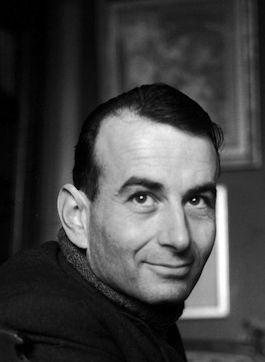

A pacifist, he nonetheless joined the Resistance and chose the name of the Vercors Massif in the Alps. With Pierre de Lescure he co-founded "Les éditions de minuit" in 1941.
They first published in 1942 his short story "Le silence de la mer", one of his most remarkable works, followed by texts of Paul Éluard, François Mauriac, André Gide, Jean
Paulhan...
After the war, he refused to help set on a black list of writers and was strongly opposed to the use of torture during the war in Algeria. Vercors also wrote philosophical novels,
"Les animaux dénaturés" and "Sylva", essays like "Ce que je crois" and his memories of the times of war in "La bataille du silence".

Roger Grenier
Writer Roger Grenier (19 September 1919, Caen - 8 November 2017, Paris) was also a journalist and lecturer, and he worked for the radio and for a famous publishing house too. He joined the Resistance in 1942 during WWII. He moved to Paris and participated in the Libération de Paris in 1944. He was one of the persons in charge of communications, going from one sector to another. One day he was caught by the Germans with a camera, and he was about to be shot when German speaking civilians talked to the soldiers and he was freed. He never knew who these people were nor what was said.
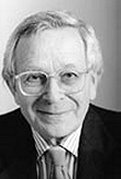


He integrated Albert Camus's editorial board at "Combat". He said later that he learnt everything while working there. Between 1949 to 2015 he wrote several works about that period: novels, like "Les Embuscades", a masterpiece, essays, like "Albert Camus, soleil et ombre : une biographie intellectuelle", and short stories, in such collections as "Brefs récits pour une longue histoire" or "Paris ma grand'ville".

Václav Havel
Václav Havel (5 October 1936, Praha - 18 December 2011, Hrádecek) was initially known as a dramatist, essayist, poet and "dissident" who was jailed several times ; he would later lead his country on the path to democracy. Still a teenager, he started to write poetry and desired to study literature or cinema at the university, but was barred from doing so by the communist regime, as he was from bourgeois background. Along with friends he founded a group that would meet to freely discuss about the regime, banned authors, like Franz Kafka, and published a clandestine periodical. As of 1955 his articles and short stories were published in several magazines, and he wrote plays, inspired by the Theatre of the Absurd and Kafka. The plays met an important success - they were even staged abroad with similar success - and his fame kept growing during the 1960s. Little by little his voice became more "dissident", in his quest for freedom and democracy.

The regime - which had hardened after the Prague Spring - considered him as a dissident: his plays were banned and he was not allowed to leave the country. In the 1970s, he wrote a plea for human rights, the manifesto for Charter 77 and co-founded the Committee for the Defense of the Unjustly Prosecuted. He was then arrested and jailed a first time - he would spend a total of about five years in prison. There, he wrote an essay which had an impact even beyond Czechoslovakia's borders. He wrote: "We simply went ahead and did certain things that we felt we ought to do, and that seemed to us decent to do, nothing more nor less". Freed after his imprisonment in early 1989 for wanting to pay tribute to Jan Palach, and following the events which were taking place in other central and eastern European countries, he was a key figure during the mass demonstrations which led to the Velvet Revolution. Pushed by the people's will, he ended up accepting his election as President of Czechoslovakia, in the interim. In 1990, he was elected again after the first free elections. He met European country and superpower leaders to set new international relationships and initiated the changes to lead the country towards democracy.
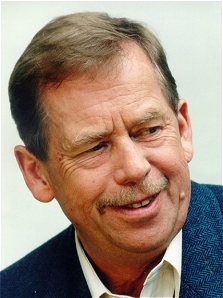
In 1992, Havel resigned as he was opposed to the partition of the country between Czechs and Slovaks, which appeared to become inevitable. After a short withdrawal period, he was elected President of the new Czech Republic and kept on building democracy and transforming Czechia into a modern and fair state. After the end of his presidency, he made speeches and participated in symposiums, took part in foundations, advocated environmental causes and wrote new works. He was a critic of neo-capitalism, which ignores men, countries and their history. His fellow countryman, writer Milan Kundera said of Havel's achievements: "Václav Havel's most important work is his own life".

Midnight Oil
Midnight Oil are an Australian rock band which origins go as far as 1972. After some personnel and name changes, the group raised to national fame during the early 1980s with the classic line-up - Peter Garrett (vocals), Rob Hirst (drums), Jim Moginie (guitar, keyboard), Martin Rotsey (guitar) and Peter Gifford (bass) who left in 1987 and was replaced by Bones Hillman. In 1984 they topped the national charts with their remarkable album "Red Sails in the Sunset" and achieved international fame, which kept on growing with the release of "Diesel and Dust" in 1985 and "Blue Sky Mining" in 1990 and their furious live performances.

Midnight Oil have long been critics of certain aspects of our world: (American) military interventions, nuclear weapons and nuclear energy, consumerism and neo-capitalism, injustices involving the Aborigines, etc. They participated in Nuclear Disarmament concerts and environmental causes, and toured Australia with two indigenous groups, giving royalties of some of their music to Aboriginal organisations.
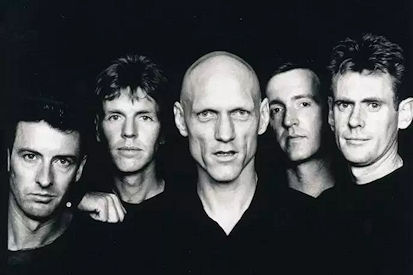
Johnny Clegg
Johnny Clegg was born 7 June 1953 in Bacup, UK, but grew up mainly in South Africa. The family settled for two years in Zambia, where he went to a multiracial school. Back in Johannesburg, his step-father enjoyed taking him out in the wilderness during weekends. As a teenager, Johnny was struggling to find his way until he met Mntonganazo Charlie Mzila, a Zulu musician. He improved greatly his guitar skills, learnt the basics of Zulu music, language and dance, and played with his friend at a time it was strictly forbidden. He got arrested multiple times for violating apartheid laws banning people of different races from being together after curfew hours.

Aged 17, he met Sipho Mchunu and they started playing together, mixing their musical influences as well as English and Zulu lyrics. Johnny Clegg
studied social anthropology - one of his teachers was David Webster, who was later murdered because of his fight against apartheid - and wrote
several papers on Zulu music and dance. In 1979 together with Sipho and four additional musicians he released an album under the name Juluka, which
got positive reviews but was banned in South Africa.
Due to the racial laws, they could only perform in private venues, such as universities, churches, etc., and all band members were arrested several
times. Their fame grew with their next albums, first in South Africa then internationally. In 1985 Sipho decided to leave and a year later
Johnny Clegg went on to form Savuka, his second inter-racial band, which kept on mixing African music with European influences, and released
"Third World Child", a major international success. The album included one of their best and most emblematic songs, "Asimbonanga" which spoke of
Nelson Mandela who had been jailed for 25 years at the time.

They toured extensively in South Africa and the rest of the world. In 1992, Dudu Zulu, one of the musicians and dancers was murdered, causing
Savuka to disband after a final album. In 1997, Johnny and Sipho Mchunu released a new Juluka record. Later on Johnny Clegg would record and
tour under his name. In 1997 (other sources mention 1999), during a concert in Germany he was joined by then South African President Nelson Mandela,
a unique moment which was captured on video. One of his songs against segregation was
chosen as the 2010 football world cup anthem.
In 2015, Johnny Clegg who was diagnosed with cancer decided to embark on a farewell tour. He recorded his last album in 2017 and died 16 July 2019
in Johannesburg.


Roger Waters
Roger Waters was born during WWII, his father Eric Fletcher Waters was killed the following year near Anzio with the other soldiers of his company during Operation Shingle. Raised in Cambridge, where he met two of his future band mates and where he was the chairman of a youth group campaigning for nuclear disarmament, he later enrolled in a school of architecture in London, where he met the other two future members of the band. He started playing music - first guitar then bass. In 1966 Pink Floyd was officially born. Two years later, co-founder and frontman Syd Barrett left due to mental illness and was replaced by David Gilmour, bringing a shift in the group leadership. Waters became a dominant songwriter and the principal lyricist. As of 1973 he would provide thematic ideas that would serve as the basis for the different records. These concept albums would meet major international success - like "Wish You Were Here" and "The Wall", but Waters would slowly take creative control between the two. He started alluding to war as early as 1968, and referred to war and the loss of his father in a more and more direct way, culminating with "The Wall" and "The Final Cut".
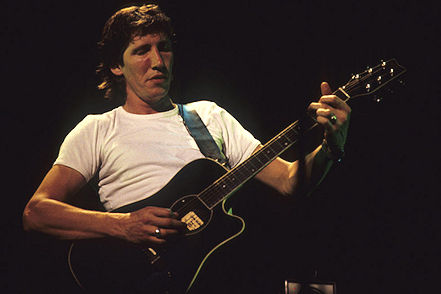
"Wish You Were Here" was about success and the price to pay - with extraordinary pieces like "Shine on Your Crazy Diamond" and the eponymous song -, something that Pink Floyd had experienced first-hand ; "The Wall" was close to a musical autobiography. Roger Waters would try to settle a score with many things - school, war, his father's death, self-isolation, madness, fascism, ex-wives, groupies... - and producer Bob Ezrin should be thanked for his invaluable help in bringing the project to life in a difficult context. Its follow-up, the underrated "The Final Cut" went even further: most songs relate to war - from the past, with both world wars, to the future of a pending nuclear apocalypse, through the conflicts of the time (Falklands, Afghanistan, Lebanon, etc.). Waters seemed desperate of the disintegration of the post-war dream, the soldiers' psychological stigma, the death of children... After leaving Pink Floyd in 1985, he embarked on a solo career. In 1990 he was a key participant in a large charity event with a huge concert in Berlin, shortly after the fall of the Wall.

In 1992 Roger Waters released "Amused to Death", a high-quality album, to critical acclaim. The record was focusing on recent events (Tiananmen
Square protests, Gulf War) and the role of media - especially television - in our perception of the events and of war. In 2004 he released
online two new anti-war songs ("To Kill the Child" and "Leaving Beirut") linked to the invasion of Iraq and his memories of Lebanon as a youth.
In 2005, he reunited with his three former band mates for a one-off at the Live 8 benefit concert in London. He started touring with "The Wall" in
2010, the last concert taking place in Paris in September 2013.
Roger Waters has also been an activist, and has joined the "Boycott, Divestment and Sanctions" movement in solidarity with Palestinians against
Israeli occupation of the Palestinian territories. Accused by some people of anti-Semitism, he has replied that "criticism of the Israeli government's
flouting of international law and abuses of human rights has nothing to do with the Jewish faith or Jewish people".
He has also taken part in charity efforts after the 2004 Indian Ocean earthquake and tsunami, in an organization fighting poverty and malaria, in a
benefit for United States military veterans. In the recent years he has also been quite vocal against far-right politicians and brash populists
in the USA, UK, Brazil, etc.

Peter Gabriel
Peter Gabriel had an early interest in music and played different instruments in addition to singing. In 1968 he co-founded Genesis with
fellow-students. After a few years of personnel changes and little success, their fame grew in the early 1970s. Gabriel started wearing costumes,
masks, helmets and fluorescent make-up during concerts. "Selling England by the Pound", released in 1973, did very well in the charts. But
tensions started to rise and after a final album and tour with Genesis, Gabriel departed from the band in 1975.
He took piano and music lessons before releasing his first two solo albums in 1977 and 1978, produced by Bob Ezrin and Robert Fripp, which both
charted well. His third solo album looked in new directions as he had developed a strong interest in African music. The album topped the UK chart
in 1980 and was quite successful elsewhere. It includes "Biko", a song inspired by the death of Steve Biko, a South African anti-apartheid activist,
at the hands of the police in 1977.

Peter Gabriel kept on increasing his musical skills (including production), using a mobile studio at home. He started to compose music for movies
- like Alan Parker's "Birdy". His fifth album was an international hit in the mid 1980s. The following albums were released at a much slower pace
- for instance "Up" was released in 2002, ten years after the previous studio album - and focused on personal themes (failed marriage, psychotherapy,
family relationships, fears, birth, death...). Over the years he developed many collaborations with other prominent popular artists.
His interest in African music - or more globally world music - had an impact on the evolution of western pop music. He co-founded the WOMAD
festival and movement and created the Real World Studios and Record Label to help promote such music.

Interested in the defence of peace and human rights, he has participated in different actions and charities - like the Amnesty International
concerts in the 1980s and 1990s, the Live 8 concert in 2005, the Nelson Mandela's 46664 concert against AIDS... He has helped founding and
funding The Elders, an organisation of elder statesmen, peace activists and human rights advocates, together with Nelson Mandela.
He has founded Witness, a charity that trains human rights activists to use video and the internet to expose abuses. In recent years, he has taken part
in protests and efforts against human rights abuses or conflicts in Iran, Syria, Tibet, Hong Kong, Gaza. Like Desmond Tutu
or Roger Waters, he has been advocating a two-state solution.
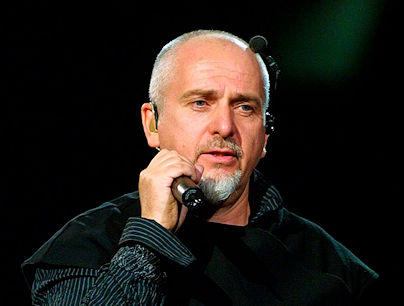
Gino Bartali
Gino Bartali (18 July 1914, Ponte a Ema - 5 May 2000, Firenze), one of the most noted champion cyclists of the 20th century, was also a very pious man. He started working in a bicycle shop when he was a teenager ; his boss, Oscar Casamonti, detected his talent and helped him buy a bicycle. It was not long before Bartali won races and became a serious contender among young amateurs. He turned professional in 1935, and rapidly displayed great qualities as a climber but also a sprinter, winning stages in his first Giro d'Italia and other races in France and Spain. In 1936 he won the Giro, but the season was marred with the accidental death of his younger brother during a race, and he was close to quitting. He won the Giro again in 1937 ; in 1938 he focused on the Tour de France and won the race with an 18 minute lead. In 1939, he finished second of the Giro, marvelled at the qualities of the young Fausto Coppi, but could not take part in the Tour because of the rising tensions in Europe. In 1940 he helped Coppi secure the victory in the Giro. After the war, he won the Giro in 1946, finished second behind Coppi the following year, and won his second Tour in 1948 with a 26 minute lead, 10 years after his first victory. His triumph was key in the reconciliation of Italians who had been close to start a civil war after the murder attempt on the communist leader. In 1949 he was second to Coppi in both Giro and Tour. He won more races and stages the following years, retiring in early 1955. He became a sports manager and succeeded in recruiting Fausto Coppi in his team, but Coppi contracted malaria which was undiagnosed and died in January 1960. Bartali won 2 Tours, 3 Giros - being 7 times King of the Mountains -, 4 Milano-San Remo, 3 Giros di Lombardia and 4 national titles, making him, like Coppi, a "campionissimo".

The death of his younger brother was a life-changing drama for Bartali. From a frivolous young man, he turned into a pious man, praying for his
brother, joining the Secular Order of Discalced Carmelites and the Catholic Action. He was a strong anti-fascist.
He kept secret his acts during WWII, which only surfaced 13 years after his death, when he was recognized a Righteous Among the Nations. Under
the pretext of training he would ride several hundreds of kilometres to join Assisi or
other places, hiding messages and forged documents in his bicycle frame - as a member of a Resistance network lead by Firenze Archbishop and
a Rabbi, which saved some 800 Jews and Resistance fighters. He also hid a Jewish family in his cellar and in 1943 he led Jewish refugees to the
Swiss Alps.

Nelson Mandela
Nelson Rolihlahla Mandela (18 July 1918, Mvezo - 5 December 2013, Johannesburg) was the first of his family to go to - a Methodist - school. He studied law at the only University that accepted Blacks. He joined the Communist Party but also adopted the nonviolent resistance practice developed by Gandhi. He became aware of the existence of the ANC - which was opposed to racial discrimination and requested universal suffrage - and joined the party in 1943. The 1948 elections lead to the apartheid system. In the early 1950s, Mandela, one of the first black lawyers in Johannesburg, was elected national vice-president of the ANC and launched a defiance campaign. He was arrested during a mass demonstration. The government hardened its line and Mandela was given a suspended jail sentence, was barred from taking part in meetings and placed under house arrest.

So he reorganized the ANC in clandestine cells and sought to unite Blacks, Indians, people of mixed-race and anti-apartheid Whites. He was arrested again by the end of 1956 but acquitted during the trial. Some of the hardliners in the ANC founded the PAC. In 1960 in Sharpeville, the police fired at people who had been peacefully protesting with the PAC. As this caused new demonstrations, the government declared both the ANC and PAC illegal and had their leaders arrested. The UN Security Council condemned the massacre and asked South Africa to abolish apartheid. Due to the government inflexibility, Mandela called a strike and founded the ANC military branch, which started acts of sabotage - he wished to avoid deaths and he did not want interracial relations to deteriorate, but he considered the possibility of organizing guerilla warfare if sabotages were not successful. In 1962 he travelled to numerous African countries to get support from their governments and prepare armed struggle. This evolution lost him the support of several western governments and Americans helped for his arrest. He was first sentenced to five years in jail. A second trial was organized for additional charges in 1963 and he was sentenced to life imprisonment along with other leaders, avoiding the death penalty, probably because no guerilla warfare had taken place, and of international pressure and the UN condemnation of the trial and recommendations for international sanctions to end apartheid.
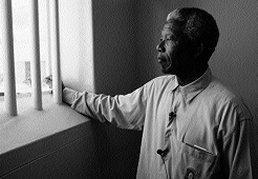

But the South African government increased racial segregation and the number of evictions of Black people moving them to townships or other
zones that they reserved to them. Mandela was sent to Robben Island prison, where he remained eighteen years. He was forced to carry out hard
labour, in inhumane prison conditions. He lead several protests and encouraged fellow-prisoners to share their knowledge. He then also tried
to understand Whites, their mindset, their fears... He learned their history and their language.
In late 1971, the UN declared that apartheid was a crime against humanity, but nothing changed. The situation deteriorated with the Soweto uprising
in 1976, caused by police firing at children and students who had come to demonstrate peacefully and the death of one of the main leaders of the
movement, Steve Biko, tortured while he was in police custody. The UN requested the release of all political prisoners and imposed an embargo on
weapons. The regime locked Mandela and other leaders in solitary confinement. In 1982, Mandela and his companions were transferred to Pollsmoor
Prison, near Cape-Town. On one hand there was an escalation of violence - ANC's military branch organized several sabotage acts or bombings that
resulted in casualties, the Zulu Inkatha party also triggered violence and death squads murdered or tortured activists, as far as in Europe -,
on the other hand contacts with Mandela were initiated by the government. He was transferred to a house in 1986 and could receive guests.

The situation in South Africa was getting worse and the state of emergency was declared ; international economic sanctions had a strong impact on the country. President Pieter Botha showed signs of openness and restarted negotiations with the ANC. Mandela met him in 1989, to see how to avoid a civil war. Mandela mentioned the necessity of universal suffrage (one man, one vote) and the need to handle the fears of the White population. Victim of a stroke, Botha was replaced by Frederik de Klerk, who released several ANC leaders in 1989, legalized the ANC and freed Mandela in 1990, after 27 years in prison.

Mandela called for the end of armed struggle and negotiated a temporary constitution with the government. The last apartheid laws were abolished
in 1991, and Mandela was elected at the head of the ANC. But the situation remained strained and there were other massacres. de Klerk had to
organize a referendum among the Whites to have a distinct majority approving the reforms, and Mandela had also to negotiate with the Zulu party
and the far-right to avoid a bloodshed and have them democratically participate in the vote. In 1993 de Klerk and Mandela jointly received the
Nobel Peace Prize.
Nelson Mandela was elected President of South Africa in 1994, leading a government of national unity. He created the Truth and Reconciliation
Commission and chose Archbishop Desmond Tutu as chairman, worked for national reconciliation initiating
diverse actions with each community, worked to rebuild the economy, and strengthen democracy for the future. In 1999 he did not, as planned,
stood for a second term in office.
Mandela created a foundation for education and to combat AIDS, supported other organizations helping children, helped solve a crisis in Burundi,
opposed to the invasion of Iraq without a UN mandate, criticized the autocratic regime in Zimbabwe, advocated the two-state solution in Israel
and Palestine, and co-founded the group of the Elders with the assistance of Peter Gabriel among others.

Other political leaders
A few other political leaders tried to make the world a better and safer place. They were far from perfect, but chose the path towards peace.
Former USSR President Mikhail Gorbachev (born 1931) and USA President Ronald Reagan (1911-2004) ended the cold war and reduced the number of
atomic weapons.
Gorbachev also initiated major reforms in the USSR, promoting glasnost - to allow freedom of speech and of the press - and perestroika - to
strengthen the economy -, and he let Eastern Bloc countries do the same and drop communism, which also lead to the reunification of Germany.


USA President Jimmy Carter (born 1924), and later Israeli leaders Itzhak Rabin (1922-1995), Shimon Peres (1923-2016) and Palestinian leader Yasser Arafat (1929-2004) promoted peace after years of war and terrorism in the middle East and Israel.


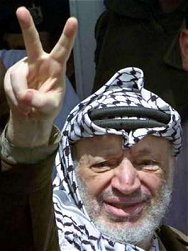
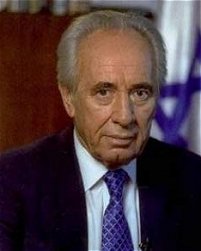
Other popular artists
A few other popular artists tried to use their fame to promote actions for humanitarian or environmental causes.
Bob Geldof, the frontman of the Irish rock band "The Boomtown Rats", who also starred in the 1982 film "Pink Floyd - The Wall",
co-founded the charity "Band Aid" group to raise money for famine relief in Ethiopia in 1984, and organized the "Live Aid" concerts the following year
and the "Live 8" concerts in 2005.
He has been a member of other organizations and foundations that combat poverty and disease in Africa and work on major issues of the continent.
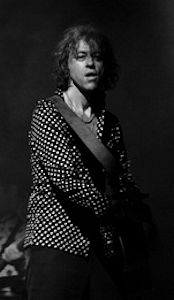
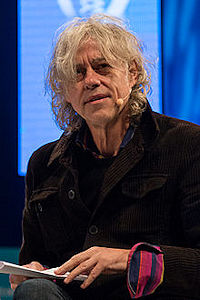
The Irish band "U2" participated in the "Band Aid" charity group and the "Live Aid" concerts. In 1986, they took part in Amnesty International actions
and in "Self Aid" to fight unemployment in Ireland. They travelled to Nicaragua, played in Sarajevo and Belfast to promote peace, supported the
Chernobyl Children's Project, etc.
In the 2000s they played at the "Nelson Mandela's 46664" concerts against AIDS, and the "Live 8" concert, and campaigned with Geldof to promote the
cancellation of third-world debt.
In 2020, U2 donated €10 million to buy protective equipment for healthcare workers in Ireland during the pandemic.


Sting, who got famous as the frontman of the English rock band "The Police" and later for his solo work, which includes gems like "Russians", got
involved in human rights in 1981 with Amnesty International concerts - he would be a regular participant from then on. He joined "Band Aid" and
played at "Live Aid" and twenty years later at "Live 8".
He co-founded the Rainforest Foundation Fund to help protect the rainforests and indigenous peoples living there and took part in actions linked
to Chile, the 9/11 attacks, the 2004 Indian Ocean earthquake and tsunami, Tibet... He has also funded foundations combatting AIDS or poverty.


